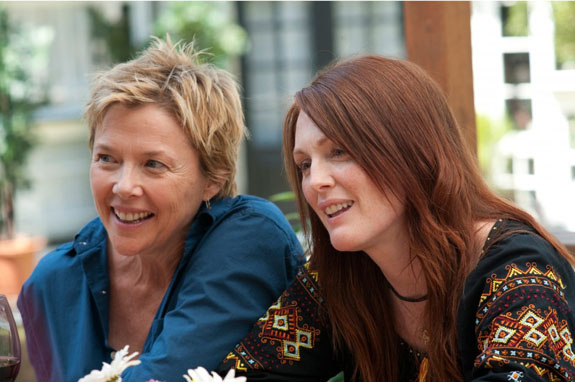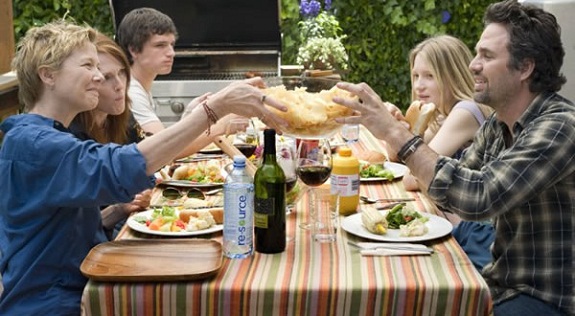|
Part of me wants to stand apart from the
gushing critical praise that’s been heaped upon
Lisa Cholodenko’s
touching and deftly observed family drama,
The Kids are All Right,
but screw it: this is a funny, beautifully acted film that illuminates
the difficulties of relationships, marriage and family.
It centres
on an unconventional two-mum family. The women are played by
Annette Bening
(Nic) and Julianne
Moore (Jules), both classy actors
who are believable as a long-term couple. The striking Bening is the
breadwinner of the family, a strong-willed doctor who’s understandably
protective of her two children, Joni (the radiant
Mia Wasikowska,
Alice in Wonderland)
and Laser (Josh
Hutcherson). By
contrast, the loose and lovable Jules has meandered through different
jobs since attending college, and is now considering starting her own
gardening business.

Annette
Bening and Julianne Moore as the central, totally believable, couple of
“The Kids are All Right”
The kids are reaching the age where their parents seem dorky and
overbearing (“Huuugs?” Nic and Jules ask Laser sweetly in unison, to
which he can only derisively point to Nic and reply, “Hug her. That’s
what she’s there for.”), and Joni, just 18, arranges to meet their sperm
donor Paul (a groovy Mark Ruffalo) at the behest of the
younger and much more curious Laser. The scene that follows is exhibit A
in the minute awkwardness of social situations, and is reminiscent of
Alexander Payne’s Sideways, another sly emotional drama from
2004.
Paul, a lovable slacker
pawned over by attractive women at his little organic restaurant, soon
finds his way deeper into the lives of the kids and their “momses” much
to the chagrin of Nic. Jules is more curious of his affable,
roll-with-it presence, and ends up helping him landscape his slanting
backyard.
The conflict that
ensues goes places you can likely predict, but even those developments
are refreshingly devoid of a political agenda, and are free in their
emotion and sexuality. If any couple is shortchanged by the overt
sexuality of the movie, its Nic and Jules, who have awkward sex while
watching gay male-porn (which they watch, as Jules explains later to a
pained Laser, for the thrill of seeing sexuality externalized).
Otherwise, their opposites-attract relationship is as complex a mixture
of idealism and compromise as a real 20-year marriage.

Much of this is due to
the outstanding performances, especially from Bening, who’s steely eyes
belie a gaggle of conflicting emotions; even when it all goes to hell,
you feel her love for Jules and her wordless determination to make
things right. This undercurrent is so strong that we still sympathize
with her even when Cholodenko gently satirizes her highly-strung
personality. The great strength of The Kids are All Right is
that Cholodenko, who co-wrote the screenplay with Stuart Blumberg,
achieves this for every character. They’re complex, likable and flawed;
in other words, they’re real.
Wasikowska, underused
in Tim Burton’s Alice in Wonderland (but not in TV’s In
Treatment) is also impressive. It’s her Joni, genuinely enamoured
by Ruffalo’s charm (who wouldn’t be?), but still sensitive to her
mothers’ struggles, who lies at the heart of the film, and it’s her
character’s imminent move to college that frames the story and adds
dramatic momentum.
The film is filled with little emotional
moments, such as the skirting glances between Nic and Jules and the
eventual uncertainty and loneliness that seeps into Paul. And it’s in
these that The Kids are All Right finds a kind of raw truth.
It’s
is
one of the year’s best movies. |